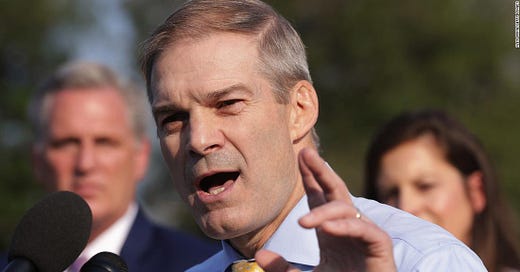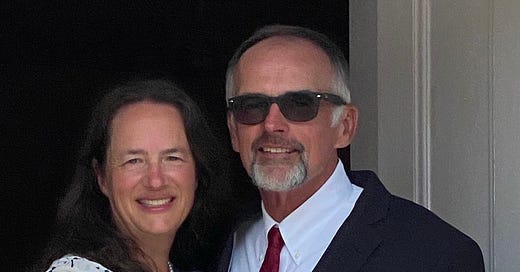
Last week, we lost a crucially important voice in the media when media reporter Eric Boehlert died unexpectedly. In his last column for his publication Press Run, titled “Why is the press rooting against Biden?,” Boehlert wrote that there is such a “glaring disconnect between reality and how the press depicts White House accomplishments” that it seems the press is “determined to keep Biden pinned down.”
Boehlert pointed to the extraordinary poll showing that only 28% of Americans know the country has been gaining jobs in the last year—7 million jobs, in fact—while 37% think the country has lost jobs. Under Biden, the U.S. has added more than 400,000 jobs a month for 11 months, the longest period of job growth since at least 1939. And yet, Boehlert pointed out, on the day the latest job report was released, cable news used the word “inflation” as many times as “jobs.” On Sunday, NBC’s “Meet the Press” ignored the economy and instead featured conversations about two problems for the Democrats in the midterms: immigration and Trump.
It is no secret that we are in a battle between democracy and authoritarianism in America and around the world. It seems to me that the Biden administration is seeking to weaken the ties of misguided voters to authoritarianism by proving that a democratic government can answer the needs of ordinary Americans. The administration appears to be taking the position that focusing on the latest outrage from the right wing locks the country into their view of the world: you are either for Trump or against him. Instead, the administration seems to be trying to demonstrate its own worldview, but with the press glued to Trump and the Republicans, the administration is having a hard time getting traction.
The White House has taken on the idea that the Democrats are unpopular in rural areas. On March 31, the Department of the Interior announced a $420 million investment in clean water in Iowa, Minnesota, Montana, New Mexico, North Dakota and South Dakota. Today, the president announced a $440 million commitment to an “America the Beautiful Challenge” to attract up to $1 billion in private and philanthropic donations to conserve land, water, and wildlife across the country.
It also released today a 17-page bipartisan “playbook” to help rural communities identify more than 100 programs designed to fund rural infrastructure. It explains how to apply for funds to expand rural broadband, clean up pollution, improve transportation, fix rural bridges and roads, ensure clean water and sanitation, prepare for disasters including climate change, upgrade the electrical grid, and so on. These are critical needs that local communities, which cannot afford lobbyists, might need help navigating.
The administration is also sending officials into rural communities to make sure that billions of federal dollars and the resources they command reach across the country. Agriculture Secretary Tom Vilsack, Commerce Secretary Gina Raimondo, Energy Secretary Jennifer Granholm, EPA Administrator Michael Regan, Interior Secretary Deb Haaland, Transportation Secretary Pete Buttigieg, and Infrastructure Coordinator Mitch Landrieu will all be on the road.
Also today, the administration took steps to address medical billing practices and medical debt. It will collect information on how more than 2000 providers handle patients, and will weigh that information into grant-making decisions as well as sharing potential violations with law enforcement. The newly rebuilt Consumer Financial Protection Bureau, gutted by the former president, will investigate and hold accountable debt collectors that violate patients’ rights. The administration is also eliminating medical debt as a factor for underwriting in federal loan programs.
Last week, Biden extended the moratorium on most federal student loan programs through the end of August—sooner than most Democrats wanted—and expunged the defaults of roughly 8 million federal student loan borrowers, permitting them to resume payments in good standing.
Finally, today, Biden nominated Steve Dettelbach, a former U.S. Attorney for the Northern District of Ohio, to direct the Bureau of Alcohol, Tobacco, Firearms, and Explosives (ATF). The bureau has not had a Senate-confirmed director since 2015 because gun-rights groups oppose those nominated to the position. The Senate has confirmed only one director in the past 16 years. Dettelbach is Biden’s second nominee; the Senate scuttled the first, a former ATF agent who called for gun regulations.
The administration today announced a Justice Department rule that manufacturers of gun kits, which enable people to build weapons at home, will be considered gun manufacturers and must be licensed, the gun parts must have serial numbers, and buyers must have background checks. So-called ghost guns, assembled at home and unmarked and untraceable, are increasingly widespread. From 2016 to 2020, law enforcement recovered nearly 24,000 ghost guns at crime scenes.
Polls widely show that more than 80% of Americans support background checks for gun buyers. Nonetheless, Gun Owners of America vowed to fight the rule.
Biden’s worldview in which the government works for ordinary people contrasts with what we are learning about the worldview of the former administration under Trump, where a lack of oversight meant that money went to grifters and well-connected people.
There have been plenty of stories about the misuse of funds under the Trump administration, including the story on March 28 by Ken Dilanian and Laura Strickler of NBC that prosecutors are calling the distribution of funds under the Paycheck Protection Program (PPP), designed to keep businesses afloat during the pandemic, “the largest fraud in U.S. history.” As much as 10% of the relief money—$80 billion—was stolen in 2020, as money went out the door without verification checks (the Biden administration has since imposed verification rules). Swindlers also stole $90 billion to $400 billion from the Covid unemployment relief program, and another $80 billion from a different Covid relief program.
We have also learned that the State Department can’t account for the foreign gifts Trump, former Vice President Mike Pence, and other administration officials received in office because the officials did not submit an accounting, as is required by law.
But those stories pale in comparison to the news broken last night by David D. Kirkpatrick and Kate Kelly of the New York Times: six months after Trump left office, an investment fund controlled by the crown prince of Saudi Arabia, Mohammed bin Salman (MBS), invested $2 billion with Trump’s senior advisor and son-in-law Jared Kushner, despite the fact that the fund advisors found Kushner’s new company “unsatisfactory in all aspects.” At the same time, they also invested about $1 billion in another new firm run by Trump’s former treasury secretary, Steven Mnuchin.
Kushner has little experience in private equity, and his firm consists primarily of that Saudi money; no American institutions have invested with him. The Saudi investment will net Kushner’s firm about $25 million a year in asset management fees, and the investors required him to hire qualified investment professionals to manage the money.
It certainly looks as if Kushner is being rewarded for his work on behalf of the kingdom, and perhaps in anticipation of influence in the future. Kushner defended MBS after news broke that the crown prince had approved the killing and dismemberment of U.S. resident and Washington Post columnist Jamal Khashoggi. Kushner helped to broker $110 billion in arms sales to Saudi Arabia, even as Congress was outraged by MBS’s war in Yemen. Most concerning, though, is that Kushner had access to the most sensitive materials in our government. Career officials denied Kushner’s security clearance out of concern about his foreign connections, but Trump overruled them.
We also know that classified material labeled “Top Secret” was in the 15 boxes of documents belonging to the National Archives and Records Administration that Trump took to his home at Mar-a-Lago after he left the White House. The Federal Bureau of Investigation is currently investigating.
—
Notes:
https://www.whitehouse.gov/wp-content/uploads/2022/04/BIL-Rural-Playbook-.pdf
https://www.politico.com/news/2022/04/06/biden-defaults-federal-student-loan-borrowers-00023355
https://www.govinfo.gov/content/pkg/FR-2022-04-11/pdf/2022-07641.pdf
https://www.nytimes.com/2022/04/10/us/jared-kushner-saudi-investment-fund.html


https://www.nytimes.com/2022/04/07/us/trump-classified-information.html
https://morningconsult.com/2021/03/10/house-gun-legislation-background-checks-polling/







Boehlert wrote that there is such a “glaring disconnect between reality and how the press depicts White House accomplishments” that it seems the press is “determined to keep Biden pinned down.”
I am not surprised. Democrats govern better than Republicans (although Trump and his acolytes set new lows.) But people don't vote according to their interests. They vote to support those they identify with. And we Democrats are poor at messaging.
I would love to see more coverage in this blog about the struggles by Democrats to get the message across, especially to the voters who have turned against them.
Currently I'm reading everything I can to understand this better, including, recently, Jonathan Haidt's The Righteous Mind: Why Good People are Divided by Politics and Religion, where he shows that Democrats appeal to two fundamental moral foundations, Care/harm and Fairness/cheating, while conservatives appeal to the full complement of six, which adds Loyalty/betrayal, Authority/subversion, Sanctity/degradation and Liberty/oppression. Democratic messaging -- not governance -- doesn't address the last four. What if we forcefully appealed to these also? (He writes this about conservative values, which he differentiates from today's radicalized Republican party.) Haidt lays out the evidence base for these moral foundations being innate as well as for people having a genetic disposition to be liberal or conservative. We need to reach those who don't as easily identify as liberal.
He is one of many who explores the societally disintegrating force of social media since 2011, especially in a new article in The Atlantic, "Why the past ten years of American life have been uniquely stupid: It's not just a phase." In that article he identifies the specter of artificial intelligence programs that can write a story and slant it in any direction so that such disinformation will increasingly flood social media and its unregulated algorithms. Our adversaries make up all sorts of outlandish lies that undermine our shared sense of reality and inoculate authoritarians from being blamed by blaming their opponents first. This firehose of noise takes up all of the oxygen. Of course there's the lock Republicans have on propaganda to radicalize conservatives through talk radio, cable news and other media. The GOP became very disciplined in messaging starting with the Reagan Administration. Propaganda and disinformation practices have long been carried out by Russia and are being exploited by other adversaries.
That is the war we are fighting. Blogs like this ground Democrats' actions in our history and reveal their efforts to do the right thing. But it's only reaching those of us with a liberal orientation.
Biden's achievements are being ignored, while the Republican buffoonery is splattered across headline news to attract readership. Why can't people be more intelligent, critical seers? What's more important, the facts or trumpesque sensationalism?